Feng Shui is an ancient Chinese practice that focuses on harmonizing the energy in our living spaces. The belief is that by creating a balanced and harmonious environment, we can enhance our well-being and invite positive energy into our lives. One of the key elements in Feng Shui is the use of plants, which play a vital role in this philosophy. In this article, we will explore the foundational concepts of Feng Shui and delve into the significant role that plants play in achieving harmony and prosperity. In the world of Feng Shui, every element and object holds a particular meaning and purpose. The Chrysanthemum, a beautiful and vibrant flower, is no exception to this rule. This article explores the Chrysanthemum’s role in Feng Shui philosophy, its symbolism, and how you can leverage its presence to enhance your living space and your life.
In the world of Feng Shui, every element and object holds a particular meaning and purpose. The Chrysanthemum, a beautiful and vibrant flower, is no exception to this rule. This article explores the Chrysanthemum’s role in Feng Shui philosophy, its symbolism, and how you can leverage its presence to enhance your living space and your life. Lucky Bamboo, scientifically known as Dracaena Sanderiana or Dracaena Braunii, is a versatile and revered plant in the world of Feng Shui. This elegant, low-maintenance plant has earned its popularity due to its association with prosperity, longevity, and good fortune. In this article, we will explore the significance of Lucky Bamboo in Feng Shui philosophy, its symbolism, how to maximize its benefits in Feng Shui, and the numerous advantages it offers within this ancient practice.
Lucky Bamboo, scientifically known as Dracaena Sanderiana or Dracaena Braunii, is a versatile and revered plant in the world of Feng Shui. This elegant, low-maintenance plant has earned its popularity due to its association with prosperity, longevity, and good fortune. In this article, we will explore the significance of Lucky Bamboo in Feng Shui philosophy, its symbolism, how to maximize its benefits in Feng Shui, and the numerous advantages it offers within this ancient practice. Feng Shui, the ancient Chinese practice of arranging our living spaces to promote harmony and well-being, places a strong emphasis on the use of plants to balance and enhance the flow of energy (Qi) within our homes. One plant that holds a special place in Feng Shui is the Money Plant, scientifically known as Crassula. In this article, we will delve into the role, symbolism, ways to maximize its Feng Shui potential, and the benefits associated with this plant in the Feng Shui philosophy.
Feng Shui, the ancient Chinese practice of arranging our living spaces to promote harmony and well-being, places a strong emphasis on the use of plants to balance and enhance the flow of energy (Qi) within our homes. One plant that holds a special place in Feng Shui is the Money Plant, scientifically known as Crassula. In this article, we will delve into the role, symbolism, ways to maximize its Feng Shui potential, and the benefits associated with this plant in the Feng Shui philosophy. Feng Shui, the ancient Chinese art of creating harmonious environments, relies on various elements, including the strategic use of plants. Among these, the Heartleaf Philodendron (Philodendron hederaceum) holds a special place. In this article, we will explore the significance of the Heartleaf Philodendron in the context of Feng Shui, its symbolism, how to maximize its presence in your space, and the benefits it brings to the practice of Feng Shui.
Feng Shui, the ancient Chinese art of creating harmonious environments, relies on various elements, including the strategic use of plants. Among these, the Heartleaf Philodendron (Philodendron hederaceum) holds a special place. In this article, we will explore the significance of the Heartleaf Philodendron in the context of Feng Shui, its symbolism, how to maximize its presence in your space, and the benefits it brings to the practice of Feng Shui. Feng Shui, the ancient Chinese practice of harmonizing one’s surroundings, incorporates various elements to create an atmosphere of balance and positivity. Plants play a vital role in this philosophy, and one of the most beloved and cherished plants in Feng Shui is lavender. In this article, we will delve into the significance of lavender in Feng Shui, its symbolism, how to harness its power, and the many benefits it brings to your living space within this ancient philosophy.
Feng Shui, the ancient Chinese practice of harmonizing one’s surroundings, incorporates various elements to create an atmosphere of balance and positivity. Plants play a vital role in this philosophy, and one of the most beloved and cherished plants in Feng Shui is lavender. In this article, we will delve into the significance of lavender in Feng Shui, its symbolism, how to harness its power, and the many benefits it brings to your living space within this ancient philosophy.
Understanding Feng Shui:
Feng Shui, which translates to “wind and water,” is a complex system of principles and guidelines that aim to create a harmonious and balanced living environment. It is rooted in the idea that the arrangement of our surroundings can significantly influence our health, happiness, and success. Central to Feng Shui is the concept of Qi, the life force or energy that flows through everything, including our living spaces.The Role of Plants in Feng Shui:
Plants have been an essential element of Feng Shui for centuries. They are believed to harness the energy of Qi, making them a potent tool for promoting balance and well-being. Here are some key ways in which plants contribute to the practice of Feng Shui:- Enhancing Positive Energy: Plants, with their vibrant and growing nature, are seen as energy enhancers. They are capable of purifying the air, improving the flow of positive energy, and removing negative influences within a space.
- Symbolism: Many plants carry specific symbolism in Feng Shui. For example, the Bamboo plant symbolizes resilience and flexibility, while the Crassula (Money Plant) signifies wealth and financial growth. By strategically placing these plants, you can invite their associated energies into your life.
- Balancing Elements: Feng Shui revolves around the balance of five natural elements: Wood, Fire, Earth, Metal, and Water. Plants, particularly those with wood elements like bamboo, help to enhance and balance these elements within a space, ensuring harmony and equilibrium.
- Aesthetic Appeal: Feng Shui encourages the use of aesthetically pleasing plants. A well-maintained, healthy plant adds visual appeal to your home, promoting a sense of calm and tranquility.
- Well-Being: Some plants, like Lavender, are known for their calming and stress-reducing properties. Placing them in bedrooms or meditation spaces can create a serene atmosphere, contributing to emotional and mental well-being.
Top 5 Feng Shui Plants
The Chrysanthemum
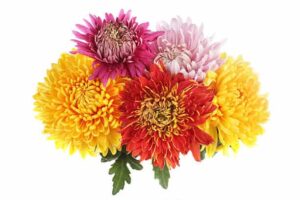 In the world of Feng Shui, every element and object holds a particular meaning and purpose. The Chrysanthemum, a beautiful and vibrant flower, is no exception to this rule. This article explores the Chrysanthemum’s role in Feng Shui philosophy, its symbolism, and how you can leverage its presence to enhance your living space and your life.
In the world of Feng Shui, every element and object holds a particular meaning and purpose. The Chrysanthemum, a beautiful and vibrant flower, is no exception to this rule. This article explores the Chrysanthemum’s role in Feng Shui philosophy, its symbolism, and how you can leverage its presence to enhance your living space and your life.The Symbolism of Chrysanthemum in Feng Shui:
- Purity and Longevity: The Chrysanthemum is highly regarded in Feng Shui for its symbolism of purity and longevity. It is seen as a representation of the metal element, which is associated with clarity and precision.
- Harmonizing Energy: Chrysanthemums are believed to have the ability to harmonize the energy within a space. They are often used in Feng Shui to help balance the flow of Qi, or life energy, creating a sense of harmony and equilibrium.
- Good Fortune and Positivity: Chrysanthemums are thought to bring good fortune and positive vibes into a home. Their bright and cheerful blooms can uplift the spirits and dispel negative energy.
Maximizing the Chrysanthemum’s Potential in Feng Shui:
- Placement: In Feng Shui, the north-west and north-east areas of your home are associated with blessings and mentors. Placing Chrysanthemums in these areas can help attract influential people into your life and enhance your personal growth.
- Health and Longevity: The Chrysanthemum is also linked to health and longevity. Consider placing it in your family or health area, such as the east or south-east sector, to promote well-being and a long, healthy life.
- Colors Matter: Chrysanthemums come in various colors, each carrying its own significance. White Chrysanthemums symbolize purity, while yellow ones represent cheerfulness and optimism. Choose the color that aligns with your intentions.
- Maintenance: To fully benefit from Chrysanthemums in Feng Shui, ensure they are healthy and well-maintained. Wilted or withering flowers can negate their positive energy.
The Benefits of Chrysanthemums in Feng Shui:
- Enhanced Clarity: The Chrysanthemum’s association with the metal element can help sharpen your mental clarity and focus. Placing it in your study or workspace can promote intellectual growth and precision.
- Positive Atmosphere: Chrysanthemums’ radiant blooms add a touch of positivity to your living space, creating a welcoming and uplifting atmosphere. This can help reduce stress and foster a sense of well-being.
- Longevity and Prosperity: With their symbolism of longevity and purity, Chrysanthemums can attract these qualities into your life. They are often used to promote a sense of fulfillment and abundance.
- Balance and Harmony: Chrysanthemums are known for their ability to balance energy in a space. Their presence can help align the flow of Qi, ensuring harmony and tranquility.
Lucky Bamboo
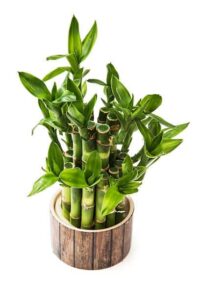 Lucky Bamboo, scientifically known as Dracaena Sanderiana or Dracaena Braunii, is a versatile and revered plant in the world of Feng Shui. This elegant, low-maintenance plant has earned its popularity due to its association with prosperity, longevity, and good fortune. In this article, we will explore the significance of Lucky Bamboo in Feng Shui philosophy, its symbolism, how to maximize its benefits in Feng Shui, and the numerous advantages it offers within this ancient practice.
Lucky Bamboo, scientifically known as Dracaena Sanderiana or Dracaena Braunii, is a versatile and revered plant in the world of Feng Shui. This elegant, low-maintenance plant has earned its popularity due to its association with prosperity, longevity, and good fortune. In this article, we will explore the significance of Lucky Bamboo in Feng Shui philosophy, its symbolism, how to maximize its benefits in Feng Shui, and the numerous advantages it offers within this ancient practice.The Role of Lucky Bamboo in Feng Shui:
Lucky Bamboo has a multifaceted role in the realm of Feng Shui, making it a sought-after addition to homes and workplaces. Here are some key aspects of its significance:- Symbolism: Lucky Bamboo is deeply rooted in Chinese culture, symbolizing the essence of life. The number of stalks in a Lucky Bamboo arrangement holds specific meanings. For instance, two stalks represent love and partnership, while three symbolize happiness, wealth, and longevity. The more stalks, the greater the blessings.
- Elemental Harmony: In Feng Shui, the balance of five natural elements—Wood, Fire, Earth, Metal, and Water—is crucial. Lucky Bamboo, with its wood element, adds to this harmony, making it a valuable addition to spaces where balance is needed.
- Positive Energy: The upward growth of the Lucky Bamboo represents continuous upward progress. It’s believed to attract positive energy and good fortune, making it an essential tool for inviting auspicious energies into your life.
- Flexibility: The adaptability of Lucky Bamboo makes it easy to incorporate into various design styles and environments. It can thrive in soil or water, and its minimalist aesthetic complements any space.
Maximizing Lucky Bamboo’s Value in Feng Shui:
To fully harness the potential of Lucky Bamboo in the context of Feng Shui, consider the following tips:- Arrangement and Placement: Position your Lucky Bamboo in areas associated with your intentions. For example, if you seek wealth and prosperity, place it in the wealth sector of your home or office. For love and relationships, choose the relationship sector. Adjust the number of stalks accordingly.
- Maintenance: Keep your Lucky Bamboo healthy by changing the water (if grown in water) regularly and providing indirect sunlight. Trim yellowing leaves to maintain its vitality and appearance.
- Vases and Containers: Choose vases or containers that complement your decor and are proportionate to the size of your Lucky Bamboo arrangement. Red or black containers are often used to enhance luck and wealth.
- Combining with Other Feng Shui Elements: Consider pairing Lucky Bamboo with other Feng Shui elements like crystals, mirrors, or Feng Shui coins to amplify its positive effects.
Benefits of Lucky Bamboo in Feng Shui:
The advantages of incorporating Lucky Bamboo into your Feng Shui practice are numerous:- Positive Energy Flow: It encourages the flow of positive energy, creating a harmonious and prosperous environment.
- Financial Growth: In the wealth sector, Lucky Bamboo is believed to attract financial opportunities and success.
- Relationship Enhancement: Placing Lucky Bamboo in the relationship sector can help improve and strengthen personal and professional relationships.
- Stress Reduction: The presence of Lucky Bamboo can create a calm and serene atmosphere, reducing stress and promoting mental well-being.
- Longevity and Health: The symbolism of longevity associated with Lucky Bamboo can promote overall health and well-being.
Money Plant (Crassula)
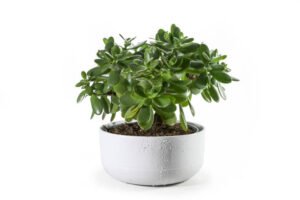 Feng Shui, the ancient Chinese practice of arranging our living spaces to promote harmony and well-being, places a strong emphasis on the use of plants to balance and enhance the flow of energy (Qi) within our homes. One plant that holds a special place in Feng Shui is the Money Plant, scientifically known as Crassula. In this article, we will delve into the role, symbolism, ways to maximize its Feng Shui potential, and the benefits associated with this plant in the Feng Shui philosophy.
Feng Shui, the ancient Chinese practice of arranging our living spaces to promote harmony and well-being, places a strong emphasis on the use of plants to balance and enhance the flow of energy (Qi) within our homes. One plant that holds a special place in Feng Shui is the Money Plant, scientifically known as Crassula. In this article, we will delve into the role, symbolism, ways to maximize its Feng Shui potential, and the benefits associated with this plant in the Feng Shui philosophy.Role in Feng Shui:
The Money Plant, or Crassula, is considered an auspicious plant in Feng Shui due to its symbolism of prosperity, wealth, and financial growth. Its role in Feng Shui is to attract positive energy and good fortune, making it a popular choice for those seeking financial well-being and abundance.Symbolism in Feng Shui:
The Money Plant’s symbolism in Feng Shui can be attributed to several factors:- Resilience: The Money Plant’s ability to thrive under various conditions is seen as a reflection of its resilience, which is associated with financial stability and the capacity to withstand economic challenges.
- Leaf Shape: The rounded, coin-like leaves of the Money Plant are believed to represent coins, making it a symbol of wealth and financial prosperity.
- Five Elements: In Feng Shui, the Money Plant is connected to the Wood element, which signifies growth and vitality. This aligns with the idea of financial growth and expansion.
Maximizing Money Plant’s Feng Shui Potential:
To harness the full Feng Shui potential of the Money Plant, consider the following tips:- Placement: Position your Money Plant in the wealth area of your home or office, typically the southeast corner. Placing it in this sector is believed to enhance your financial prospects.
- Healthy Growth: Ensure your Money Plant is well-maintained, with vibrant green leaves. A healthy plant is thought to attract greater wealth and prosperity.
- Number of Stalks: In Feng Shui, the number of stalks the Money Plant has can impact the type of energy it attracts. For example, three stalks symbolize happiness, wealth, and longevity, while five stalks represent the five elements and overall balance.
Benefits in Feng Shui:
The Money Plant in Feng Shui offers several advantages:- Wealth Attraction: It is believed to bring wealth and financial abundance into your life when placed in the right spot.
- Positive Energy: The Money Plant enhances the flow of positive Qi energy within your space, promoting a sense of well-being and balance.
- Air Purification: Like many indoor plants, the Money Plant helps purify the air by removing toxins, creating a healthier living environment.
- Stress Reduction: The presence of a well-maintained Money Plant can reduce stress and anxiety, contributing to a more relaxed atmosphere.
- Enhanced Aesthetics: Its attractive appearance adds beauty to your space, enhancing the overall ambiance and promoting tranquility.
Heartleaf Philodendron
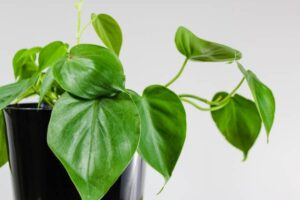 Feng Shui, the ancient Chinese art of creating harmonious environments, relies on various elements, including the strategic use of plants. Among these, the Heartleaf Philodendron (Philodendron hederaceum) holds a special place. In this article, we will explore the significance of the Heartleaf Philodendron in the context of Feng Shui, its symbolism, how to maximize its presence in your space, and the benefits it brings to the practice of Feng Shui.
Feng Shui, the ancient Chinese art of creating harmonious environments, relies on various elements, including the strategic use of plants. Among these, the Heartleaf Philodendron (Philodendron hederaceum) holds a special place. In this article, we will explore the significance of the Heartleaf Philodendron in the context of Feng Shui, its symbolism, how to maximize its presence in your space, and the benefits it brings to the practice of Feng Shui.The Role of Heartleaf Philodendron in Feng Shui:
- Symbolism in Feng Shui: The Heartleaf Philodendron is a symbol of love and emotional connections in Feng Shui. Its heart-shaped leaves are believed to attract positive energy and encourage the formation of strong bonds in relationships, making it a popular choice for enhancing the romantic and family sectors of a home.
- Balancing Energy: Feng Shui revolves around achieving a balance of energy, or Qi. The Heartleaf Philodendron, with its calming and inviting presence, contributes to a harmonious atmosphere by soothing negative influences and promoting positivity.
Maximizing the Presence of Heartleaf Philodendron in Feng Shui:
- Strategic Placement: To fully harness the benefits of the Heartleaf Philodendron, place it in areas that correspond with the elements it represents. The Wood element of the plant aligns with the east and southeast sectors, so consider these zones when arranging your plant.
- Container and Colors: Choose a decorative container, such as a pot in the colors of the Wood element (brown or green), to accentuate the positive attributes of the Heartleaf Philodendron. The container can be selected based on your personal preferences, but it should enhance the plant’s visual appeal.
- Regular Care: Healthy and well-maintained plants are essential in Feng Shui. Ensure that your Heartleaf Philodendron receives adequate sunlight, water, and care to promote growth and vitality. A thriving plant is believed to radiate stronger positive energy.
Benefits of Heartleaf Philodendron in Feng Shui:
- Promotes Love and Relationships: The Heartleaf Philodendron is known for enhancing love, harmony, and affection within a household. Its presence encourages deeper emotional connections between family members and fosters loving relationships.
- Balances Energies: This plant helps to balance and purify the energies in your home. It can absorb negative vibrations and replace them with calming and peaceful energy, making your living space more inviting and harmonious.
- Improves Air Quality: As a plant, the Heartleaf Philodendron contributes to better indoor air quality by filtering out toxins and providing a fresh oxygen supply. In Feng Shui, clean air is vital for a healthy and vibrant environment.
- Attracts Positive Qi: By adding the Heartleaf Philodendron to your home, you invite the flow of positive Qi. This can lead to greater opportunities, improved well-being, and a general sense of happiness.
Lavender
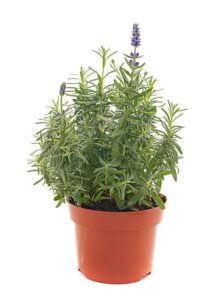 Feng Shui, the ancient Chinese practice of harmonizing one’s surroundings, incorporates various elements to create an atmosphere of balance and positivity. Plants play a vital role in this philosophy, and one of the most beloved and cherished plants in Feng Shui is lavender. In this article, we will delve into the significance of lavender in Feng Shui, its symbolism, how to harness its power, and the many benefits it brings to your living space within this ancient philosophy.
Feng Shui, the ancient Chinese practice of harmonizing one’s surroundings, incorporates various elements to create an atmosphere of balance and positivity. Plants play a vital role in this philosophy, and one of the most beloved and cherished plants in Feng Shui is lavender. In this article, we will delve into the significance of lavender in Feng Shui, its symbolism, how to harness its power, and the many benefits it brings to your living space within this ancient philosophy.The Role of Lavender in Feng Shui:
Lavender is not just a fragrant herb; it is a symbol of peace, tranquility, and well-being in Feng Shui. Here’s how it contributes to the practice:- Symbolism: Lavender embodies the Wood element in Feng Shui, signifying growth, vitality, and the beginning of a new cycle. Its purple color, often associated with royalty, is believed to bring elegance and luxury to your living space.
- Calming Energy: Lavender is renowned for its soothing properties. In Feng Shui, it is considered an antidote to stress and anxiety, creating a serene ambiance that fosters relaxation and emotional balance.
- Cleansing and Purifying: Lavender’s aromatic qualities are valued for their ability to purify the air, which is essential in Feng Shui. Clean and fresh air enhances the flow of positive Qi, the life force energy that is central to this philosophy.
- Attracting Positive Relationships: Lavender’s peaceful aura is thought to improve relationships. Placing lavender in areas where family members gather or in your bedroom can help foster harmony and loving connections.
Maximizing Lavender’s Potential in Feng Shui:
To make the most of lavender’s positive effects, consider these tips:- Strategic Placement: In Feng Shui, lavender is best placed in the bedroom, living room, or any space where relaxation and tranquility are desired. It can also be positioned near entrances to cleanse the energy as it enters your home.
- Fresh or Dried Lavender: Fresh lavender plants are fantastic for both their visual appeal and fragrance. Alternatively, dried lavender flowers can be used in sachets, potpourri, or essential oils to create a calming atmosphere.
- Proper Maintenance: To harness lavender’s power fully, ensure the plant is well-maintained. Regular pruning, proper sunlight, and adequate watering are essential for a healthy and vibrant lavender plant.
Benefits of Lavender in Feng Shui:
- Emotional Well-Being: Lavender’s calming influence helps reduce stress and anxiety, contributing to emotional well-being and inner peace.
- Improved Sleep: Placing lavender in the bedroom promotes restful sleep, which is crucial for overall health and vitality.
- Positive Relationships: By fostering an environment of tranquility, lavender can help improve communication and relationships within the family.
- Air Quality: Lavender aids in air purification, promoting a healthier and more energetic environment in line with the principles of Feng Shui.
Table of Contents
